十四类最经典句型
35个经典英语句型

ããåãAdj + as + Subject(主è¯)+ be, S + V~~~ (è½ç ¶......)
ãã ä¾ å ¥ï¼Rich as our country is, the qualities of our living are by no means satisfactory. {by no means = in no way = on no accountä¸ ç ¹ä¹ ä¸}
ããåå «ãbe + forced/compelled/obliged + to + V (ä¸ å¾ ä¸......)
ãã ä¾ å ¥ï¼Since the examination is around the corner, I am compelled to give up doing sports.
ãã å¼ è å¸ æ¯ææ ¾ç» é å °æ ä» æ ç æ å¸ ã
ããäºãNothing is + ~~~ er than to + V
ããNothing is + more +形容è¯+ than to + V
ãã ä¾ å ¥ï¼Nothing is more important than to receive education.
ãã ä¾ å ¥ï¼It pays to help others.
ãã å¸®å ©å «äººæ ¯å ¼å¾ ç ã
ããäºå å ãbe based on (以......ä¸ºå ºç¡)
英语最常用的60个句型及例句
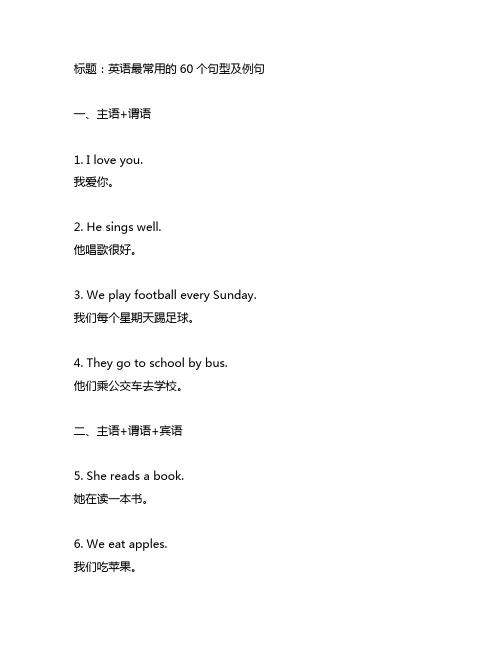
标题:英语最常用的60个句型及例句一、主语+谓语1. I love you.我爱你。
2. He sings well.他唱歌很好。
3. We play football every Sunday. 我们每个星期天踢足球。
4. They go to school by bus.他们乘公交车去学校。
二、主语+谓语+宾语5. She reads a book.她在读一本书。
6. We eat apples.我们吃苹果。
7. He speaks English.他讲英语。
8. They watch TV.他们看电视。
三、主语+谓语+宾语+宾语补足语9. She paints the wall red.她把墙刷成了红色。
10. We call him a hero.我们称他为英雄。
11. He considers the plan unfeasible. 他认为这个计划不可行。
12. They make their father proud.他们让父亲感到自豪。
四、主语+系动词+表语13. I am a teacher.我是一名老师。
14. She was happy.她很快乐。
15. He is my friend.他是我的朋友。
16. They are students.他们是学生。
五、主语+谓语+间宾+直宾17. She teaches us English. 她教我们英语。
18. He bought her a gift. 他给她买了一份礼物。
19. We tell him a story.我们给他讲故事。
20. They show us the way.他们给我们指路。
六、主语+谓语+宾补+宾语21. She made her sister cry.她让她妹妹哭了。
22. They found the problem solved. 他们发现问题已经解决了。
23. He heard the news spread.他听说了消息已经传开了。
小学英语最常用的问答句(十四种类)
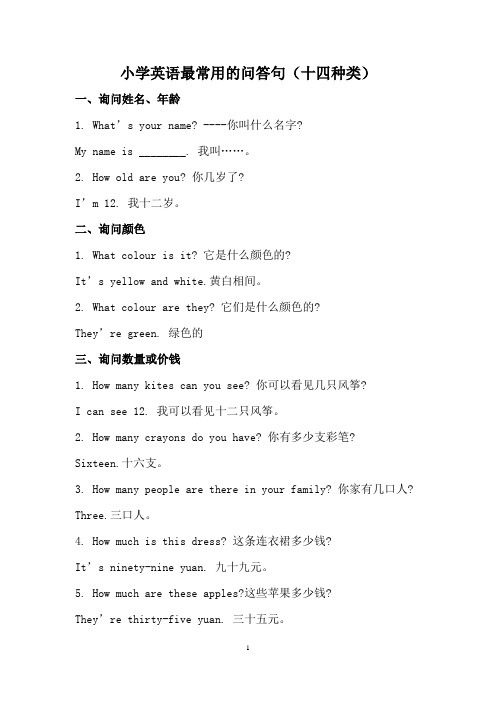
小学英语最常用的问答句(十四种类)一、询问姓名、年龄1. What’s your name? ----你叫什么名字?My name is ________. 我叫……。
2. How old are you? 你几岁了?I’m 12. 我十二岁。
二、询问颜色1. What colour is it? 它是什么颜色的?It’s yellow and white.黄白相间。
2. What colour are they? 它们是什么颜色的?They’re green. 绿色的三、询问数量或价钱1. How many kites can you see? 你可以看见几只风筝?I can see 12. 我可以看见十二只风筝。
2. How many crayons do you have? 你有多少支彩笔?Sixteen.十六支。
3. How many people are there in your family? 你家有几口人? Three.三口人。
4. How much is this dress? 这条连衣裙多少钱?It’s ninety-nine yuan. 九十九元。
5. How much are these apples?这些苹果多少钱?They’re thirty-five yuan. 三十五元。
四、询问时间或日期1. What time is it now? 现在几点钟?It’s nine o’clock. It’s time for English class.九点。
该上英语课了。
It’s eight o’clock. It’s time to go to bed.八点。
该上床睡觉了。
2. What day is it today? 今天星期几?It’s Monday. 星期一。
3. When is your birthday? 你的生日是什么时候?It’s October 1st, our National Day. 十月一日,国庆节。
84个英语基本句型

英语是一门广泛使用的语言,掌握基本句型可以帮助我们有效地表达自己的意思。
下面将介绍84个常用的英语基本句型,希望对大家学习英语有所帮助。
1. 主语 + 动词:I eat.2. 主语 + 动词 + 宾语:She reads books.3. 主语 + 不及物动词:They swim.4. 主语 + 系动词 + 表语:He is happy.5. 主语 + 动词 + 间接宾语 + 直接宾语:She gave me a gift.6. 主语 + 动词 + 宾语 + 宾语补足语:We consider him our friend.7. 主语 + 动词 + 间接宾语 + 直接宾语 + 宾语补足语:They made him their leader.8. 主语 + 动词 + 宾语 + 宾语补足语:He painted the wall red.9. 主语 + 动词 + 宾语 + 间接宾语:She told me a joke.10. 主语 + 不及物动词 + 表语:He became a doctor.11. 主语 + 不及物动词 + 宾语补足语:They elected him president.12. 主语 + 不及物动词 + 宾语 + 宾语补足语:She made him her assistant.13. 主语 + 系动词 + 宾语 + 宾语补足语:I find English interesting.14. 主语 + 系动词 + 表语 + 宾语:She called me a fool.15. 主语 + 系动词 + 宾语 + 宾语补足语:He made me his secretary.16. 主语 + 系动词 + 宾语 + 表语:They named the baby Adam.17. 主语 + 状语 + 动词:We ran quickly.18. 主语 + 状语 + 系动词 + 表语:He felt really tired.19. 主语 + 动词 + 状语:She sings beautifully.20. 主语 + 宾语 + 状语 + 动词:He won the game with great effort.21. 主语 + 宾语 + 状语 + 动词 + 宾语补足语:They elected her president with unanimous support.22. 主语 + 谓语 + 宾语 + 状语:We found the key under the bed.23. 主语 + 谓语 + 宾语 + 状语 + 宾语补足语:She named her daughter Lily out of love for flowers.24. 主语 + 谓语 + 不定式:They want to play.25. 主语 + 谓语 + 动词 + 不定式:He can swim.26. 主语 + 谓语 + 宾语 + 动词 + 不定式:She asked me to help.27. 主语 + 谓语 + 不定式 + 宾语补足语:We believe him to be honest.28. 主语 + 谓语 + 宾语 + 不定式 + 宾语补足语:He wants me to be his assistant.29. 主语 + 谓语 + 不定式 + 状语:You need to study hard.30. 主语 + 谓语 + 动名词:She enjoys swimming.31. 主语 + 谓语 + 宾语 + 动名词:They appreciate her singing.32. 主语 + 谓语 + 动名词 + 宾语补足语:I consider cooking an art.33. 主语 + 谓语 + 不定式 + 动名词:He started to learn painting.34. 主语 + 谓语 + 宾语 + 不定式 + 动名词:She saw him come in.35. 主语 + 谓语 + 宾语 + 不定式 + 状语:We made them stay longer.36. 主语 + 谓语 + 不定式 + 宾语补足语 + 动名词:He wants us to help him finish the project.37. 主语 + 谓语 + 不定式 + 宾语补足语 + 状语:I expect you to arrive on time.38. 主语 + 谓语 + 不定式 + 动名词 + 状语:They will try to solve the problem by working together.39. 主语 + 谓语 + 宾语 + 不定式 + 宾语补足语 + 状语:She persuaded him to stay after school for extra practice.40. 主语 + 谓语 + 分词:He looked tired.41. 主语 + 谓语 + 宾语 + 分词:They found the book interesting.42. 主语 + 谓语 + 分词 + 宾语补足语:We consider him qualified for the job.43. 主语 + 谓语 + 不定式 + 分词:She decided to leave quickly.44. 主语 + 谓语 + 宾语 + 不定式 + 分词:He heard her sing beautifully.45. 主语 + 谓语 + 分词 + 状语:They sat there, waiting for the bus.46. 主语 + 谓语 + 宾语 + 分词 + 状语:We saw her boarding the train.47. 主语 + 谓语 + 分词 + 宾语补足语 + 状语:He walked away, satisfied with his achievement.48. 主语 + 谓语 + 分词 + 不定式:She came running to me to ask a question.49. 主语 + 谓语 + 宾语 + 分词 + 不定式:They saw him standing alone in the rain.50. 主语 + 谓语 + 分词 + 宾语 + 不定式:We watched the movie, hoping to be entertained.51. 主语 + 谓语 + 不定式 + 分词 + 宾语补足语:He wants us to stay focused on our goals.52. 主语 + 谓语 + 不定式 + 分词 + 状语:She needs to finish her homework before going out.53. 主语 + 谓语 + 宾语 + 不定式 + 分词 + 状语:They made him work extra hours to meet the deadline.54. 主语 + 谓语 + 不定式 + 分词 + 宾语补足语:We believe you to have the ability to succeed.55. 主语 + 谓语 + 不定式 + 分词 + 宾语补足语 + 状语:He considered it a great honor to be chosen as the team captain.56. 主语 + 谓语 + 分词 + 状语 + 宾语:They finished the task, exhausted.57. 主语 + 谓语 + 宾语 + 分词 + 状语 + 宾语补足语:She found him standing there, helpless.58. 主语 + 谓语 + 分词 + 宾语 + 状语:He left the room, closing the door behind him.59. 主语 + 谓语 + 分词 + 宾语 + 宾语补足语:We saw her painting the wall red.60. 主语 + 谓语 + 宾语 + 分词 + 宾语补足语 + 状语:They heard him singing in the shower, beautifully.61. 主语 + 谓语 + 分词 + 不定式 + 状语:She stood there, not knowing what to say.62. 主语 + 谓语 + 宾语 + 分词 + 不定式 + 状语:He caught her reading his diary, secretly.63. 主语 + 谓语 + 分词 + 宾语 + 不定式 + 状语:They watched the kids playing happily in the park.64. 主语 + 谓语 + 不定式 + 分词 + 状语 + 宾语补足语:We want you to come prepared for the meeting.65. 主语 + 谓语 + 不定式 + 分词 + 宾语 + 状语:She asked me to stay quiet, not attracting attention.66. 主语 + 谓语 + 分词 + 状语 + 宾语 + 宾语补足语:They arrived at the party late, all dressed up.67. 主语 + 谓语 + 分词 + 宾语 + 状语 + 宾语补足语:I left the office, feeling satisfied with my performance.68. 主语 + 谓语 + 分词 + 宾语 + 宾语补足语 + 状语:He walked away, looking disappointed.69. 主语 + 谓语 + 不定式 + 宾语 + 分词:She wants us to keep the door closed, protecting the animals inside.70. 主语 + 谓语 + 不定式 + 状语 + 分词:They need to finish the project, no matter how hard it is.71. 主语 + 谓语 + 不定式 + 宾语 + 分词 + 状语:We would like you to come over for dinner, if you are available.72. 主语 + 谓语 + 不定式 + 分词 + 状语 + 宾语补足语:He decided to work harder, hoping to achieve better results.73. 主语 + 谓语 + 不定式 + 分词 + 宾语补足语 + 状语:She wanted him to leave, regardless of his apology.74. 主语 + 谓语 + 分词 + 宾语 + 不定式:They saw him running down the street to catch the bus.75. 主语 + 谓语 + 分词 + 不定式 + 宾语:He felt someone touch his shoulder, turning around to see who it was.76. 主语 + 谓语 + 分词 + 宾语 + 不定式 + 宾语补足语:She caught her sister eating her chocolate cake, scolding her for the theft.77. 主语 + 谓语 + 不定式 + 分词 + 宾语 + 状语:They asked me to speak louder, not being able to hear me clearly.78. 主语 + 谓语 + 不定式 + 分词 + 状语 + 宾语补足语:We advised him to approach the problem from a different angle, with the hope of finding a solution.79. 主语 + 谓语 + 不定式 + 宾语 + 分词 + 宾语补足语 + 状语:She reminded him to take his medicine, not forgetting his doctor's advice.80. 主语 + 谓语 + 不定式 + 分词 + 宾语 + 状语 + 宾语补足语:He urged them to apply for the position, fully aware of their qualifications. 81. 主语 + 谓语 + 分词 + 不定式 + 状语 + 宾语 + 宾语补足语:They watched the news report excitedly, hoping to see their favorite celebrity mentioned.82. 主语 + 谓语 + 分词 + 不定式 + 宾语 + 宾语补足语 + 状语:She left the room angrily, slamming the door shut.83. 主语 + 谓语 + 不定式 + 分词 + 状语 + 宾语 + 宾语补足语:We told him to study hard, not wasting his potential.84. 主语 + 谓语 + 不定式 + 分词 + 宾语 + 状语 + 宾语补足语:He encouraged her to believe in herself, never doubting her abilities.这些基本句型涵盖了常见的英语句子结构,掌握它们可以帮助你更好地表达自己的思想和意图。
初中语文作文常用句型整理
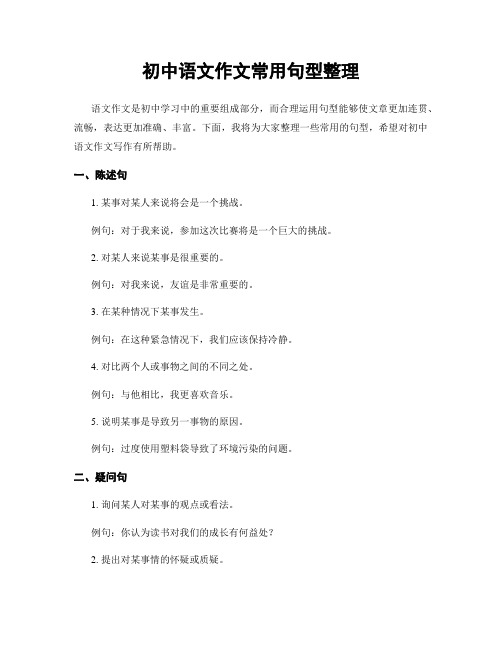
初中语文作文常用句型整理语文作文是初中学习中的重要组成部分,而合理运用句型能够使文章更加连贯、流畅,表达更加准确、丰富。
下面,我将为大家整理一些常用的句型,希望对初中语文作文写作有所帮助。
一、陈述句1. 某事对某人来说将会是一个挑战。
例句:对于我来说,参加这次比赛将是一个巨大的挑战。
2. 对某人来说某事是很重要的。
例句:对我来说,友谊是非常重要的。
3. 在某种情况下某事发生。
例句:在这种紧急情况下,我们应该保持冷静。
4. 对比两个人或事物之间的不同之处。
例句:与他相比,我更喜欢音乐。
5. 说明某事是导致另一事物的原因。
例句:过度使用塑料袋导致了环境污染的问题。
二、疑问句1. 询问某人对某事的观点或看法。
例句:你认为读书对我们的成长有何益处?2. 提出对某事情的怀疑或质疑。
例句:你相信友谊可以跨越时间和空间吗?3. 询问导致某事发生的原因。
例句:你认为环境保护应该由谁负责?三、感叹句1. 表达对某事或某人的赞美或称赞。
例句:多么美丽的花园啊!2. 表达惊讶、喜悦、遗憾等情感。
例句:真是令人惊讶的事情!四、比较句1. 对两者或多者进行比较,指出某个方面的优劣。
例句:与书本相比,网络给我们获取信息的渠道更广。
2. 强调某人或某事物的重要性。
例句:健康远比财富更重要。
五、因果句1. 指出某事物是另一事物的原因或结果。
例句:缺乏锻炼是导致肥胖的主要原因。
2. 引出一个结论。
例句:因此,我们应该采取措施保护环境。
六、条件句1. 说明某个条件下可能发生的事情。
例句:如果我们大家一起努力,我们就能取得成功。
2. 指示某个行为或结果取决于另一个行为或结果。
例句:你只有努力学习,才能取得好成绩。
七、引用句1. 引用名人或书籍中的观点或名言警句。
例句:就像马克斯·普朗克所说的:“科学不会改变世界,但科学家会。
”2. 引用事实或数据来支持论证。
例句:根据统计数据显示,越来越多的年轻人选择创业。
八、修辞句1. 使用比喻、拟人、夸张等修辞手法,使文章更加生动有趣。
高中英语高级句型归纳大全
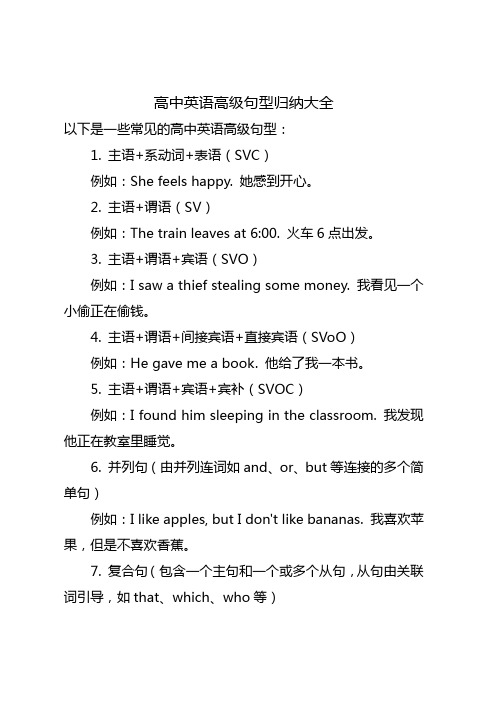
高中英语高级句型归纳大全以下是一些常见的高中英语高级句型:1. 主语+系动词+表语(SVC)例如:She feels happy. 她感到开心。
2. 主语+谓语(SV)例如:The train leaves at 6:00. 火车6点出发。
3. 主语+谓语+宾语(SVO)例如:I saw a thief stealing some money. 我看见一个小偷正在偷钱。
4. 主语+谓语+间接宾语+直接宾语(SVoO)例如:He gave me a book. 他给了我一本书。
5. 主语+谓语+宾语+宾补(SVOC)例如:I found him sleeping in the classroom. 我发现他正在教室里睡觉。
6. 并列句(由并列连词如and、or、but等连接的多个简单句)例如:I like apples, but I don't like bananas. 我喜欢苹果,但是不喜欢香蕉。
7. 复合句(包含一个主句和一个或多个从句,从句由关联词引导,如that、which、who等)例如:I like the book that he recommended to me. 我喜欢他推荐给我的那本书。
8. 祈使句(表示命令或请求的简单句)例如:Open the door! 把门打开!9. 倒装句(谓语动词的位置与正常语序不同)例如:Here comes the bus. 公交车来了。
10. 省略句(省略了某些语法成分的简单句)例如:If you can do it, so can I. 如果你能做到,我也能。
11. 虚拟语气(表示与实际情况相反的情况或假设情况)例如:If I were you, I would choose to study abroad. 如果我是你,我会选择出国留学。
12. 强调句(通过使用强调词或短语来强调某个语法成分)例如:It was she who saved the little girl. 是她救了那个小女孩。
高中英语必备40个高级句型高考必备
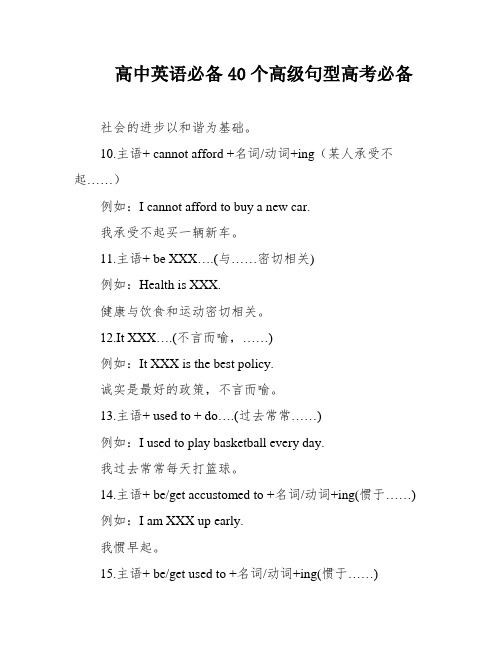
高中英语必备40个高级句型高考必备社会的进步以和谐为基础。
10.主语+ cannot afford +名词/动词+ing(某人承受不起……)例如:I cannot afford to buy a new car.我承受不起买一辆新车。
11.主语+ be XXX….(与……密切相关)例如:Health is XXX.健康与饮食和运动密切相关。
12.It XXX….(不言而喻,……)例如:It XXX is the best policy.诚实是最好的政策,不言而喻。
13.主语+ used to + do….(过去常常……)例如:I used to play basketball every day.我过去常常每天打篮球。
14.主语+ be/get accustomed to +名词/动词+ing(惯于……)例如:I am XXX up early.我惯早起。
15.主语+ be/get used to +名词/动词+ing(惯于……)例如:I am used to the cold weather here.我已经惯了这里的寒冷天气。
16.主语+ be suppos ed to + do….(应该……)例如:XXX at the airport two hours before the flight. 我们应该在飞行前两个小时到达机场。
17.主语+ be likely to + do….(可能……)例如:It XXX.晚些时候可能会下雨。
18.主语+ be willing to + do….(愿意……)例如:I am willing to help you with your homework. 我愿意帮你做作业。
19.主语+ be eager to + do….(渴望……)例如:She is eager to learn Chinese.她渴望研究中文。
20.主语+ be capable of +名词/动词+ing(能够……)例如:I am capable of finishing the project on time.我能够按时完成这个项目。
高考教学英语必考40个重点句型
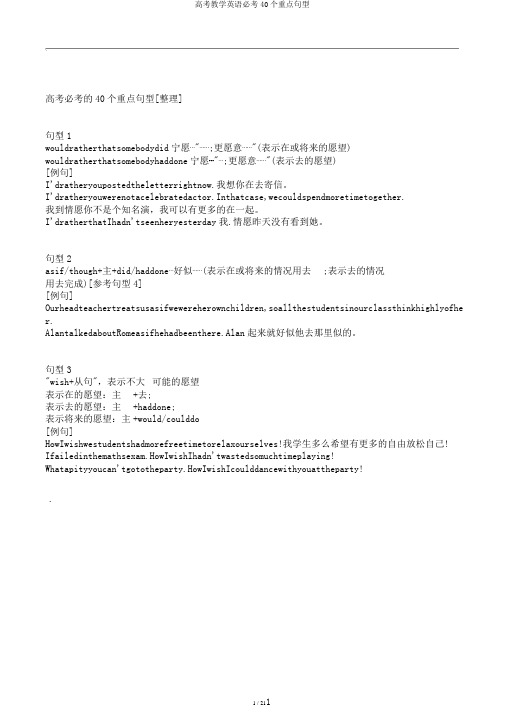
高考必考的40个重点句型[整理]句型1wouldratherthatsomebodydid 宁愿⋯"⋯⋯;更愿意⋯⋯"(表示在或将来的愿望) wouldratherthatsomebodyhaddone 宁愿⋯"⋯;更愿意⋯⋯"(表示去的愿望)[例句]I'dratheryoupostedtheletterrightnow.我想你在去寄信。
I'dratheryouwerenotacelebratedactor.Inthatcase,wecouldspendmoretimetogether.我到情愿你不是个知名演,我可以有更多的在一起。
I'dratherthatIhadn'tseenheryesterday我.情愿昨天没有看到她。
句型2asif/though+主+did/haddone⋯好似⋯⋯(表示在或将来的情况用去;表示去的情况用去完成)[参考句型4][例句]Ourheadteachertreatsusasifwewereherownchildren,soallthestudentsinourclassthinkhighlyofhe r.AlantalkedaboutRomeasifhehadbeenthere.Alan起来就好似他去那里似的。
句型3"wish+从句",表示不大可能的愿望表示在的愿望:主+去;表示去的愿望:主+haddone;表示将来的愿望:主+would/coulddo[例句]HowIwishwestudentshadmorefreetimetorelaxourselves!我学生多么希望有更多的自由放松自己! Ifailedinthemathsexam.HowIwishIhadn'twastedsomuchtimeplaying!Whatapityyoucan'tgototheparty.HowIwishIcoulddancewithyouattheparty!.→句型4It'shigh/abouttimethatsomebodydid(shoulddo)(should通常不省略) ⋯早就⋯⋯[例句]It'stimethatyouwenttoschool.=It'stimethatyoushouldgotoschool.It'shightimethatwedidsomethingtoimproveourenvironment.是我保做些事情了。
常用句型整理
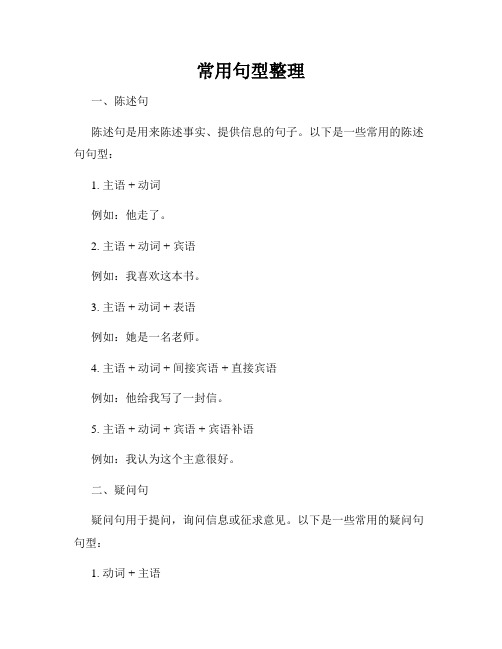
常用句型整理一、陈述句陈述句是用来陈述事实、提供信息的句子。
以下是一些常用的陈述句句型:1. 主语 + 动词例如:他走了。
2. 主语 + 动词 + 宾语例如:我喜欢这本书。
3. 主语 + 动词 + 表语例如:她是一名老师。
4. 主语 + 动词 + 间接宾语 + 直接宾语例如:他给我写了一封信。
5. 主语 + 动词 + 宾语 + 宾语补语例如:我认为这个主意很好。
二、疑问句疑问句用于提问,询问信息或征求意见。
以下是一些常用的疑问句句型:1. 动词 + 主语例如:你喜欢唱歌吗?2. 疑问词 + 动词 + 主语例如:你在哪里学习?3. 助动词 + 主语 + 动词例如:你会游泳吗?4. 疑问词 + 助动词 + 主语 + 动词例如:你为什么不来参加聚会?三、感叹句感叹句用于表达强烈的情感、惊讶或赞叹。
以下是一些常用的感叹句句型:1. 多么 + 形容词 + 名词例如:多么美丽的花啊!2. 多么 + 形容词 + 动词例如:多么令人惊讶的表演!3. 多么 + 动词例如:多么快的车速!4. 多么 + 副词例如:多么聪明地解决问题!四、祈使句祈使句用于发出请求、命令或建议。
以下是一些常用的祈使句句型:1. 动词例如:走!2. 动词 + 宾语例如:请给我一杯水。
3. 动词 + 宾语 + 宾语补语例如:你们都去尽力吧。
4. 动词 + 宾语 + 地点状语例如:把书放在桌子上。
五、条件句条件句用于表示条件、假设或可能性。
以下是一些常用的条件句句型:1. 如果 + 主句例如:如果明天下雨,我们就不去郊游了。
2. 要是 + 主句例如:要是你不来,我就一个人去。
3. 即使 + 从句,也 + 主句例如:即使你不同意,我还是会去尝试。
4. 只要 + 从句,就 + 主句例如:只要努力,就会成功。
六、比较句比较句用于比较两个事物或概念之间的差异或相似度。
以下是一些常用的比较句句型:1. A + 动词 + 形容词 + than + B例如:她比我更高。
英语的句型句式大全

英语的句型句式大全英语句型和句式有很多种,涵盖了从基础到高级的各种语法结构。
在这里,我会尽量涵盖一些常见的句型和句式,但由于篇幅限制,可能无法覆盖所有情况。
首先,我们来看一些基础的句型和句式:1. 主谓结构,主语+动词。
例如,She sings.2. 主谓宾结构,主语+动词+宾语。
例如,I eat an apple.3. 主谓宾宾结构,主语+动词+间接宾语+直接宾语。
例如,He gave me a book.4. 主系表结构,主语+系动词+表语。
例如,She is beautiful.5. There be句型,There be+主语+其他成分。
例如,Thereis a cat on the table.接下来是一些复杂句型和句式:1. 并列句,使用连词连接两个或多个并列的句子。
例如,I like coffee, but he prefers tea.2. 从句,包括定语从句和状语从句,用来修饰名词或者句子。
例如,The book that I bought yesterday is interesting.3. 虚拟语气,用来表达与事实相反的假设、愿望等。
例如,IfI were you, I would study harder.4. 倒装句,将句子的语序颠倒,常用于强调句子的某一部分。
例如,Never have I seen such a beautiful sunset.除了以上列举的句型和句式,还有条件句、感叹句、祈使句等等。
总之,英语句型和句式种类繁多,需要通过大量的阅读和实践来掌握。
希望这些例子能够帮助你更好地理解和运用英语句型和句式。
84个英语句式

以下是84个常见的英语句式:1. 主语+ 系动词+ 表语2. 主语+ 不及物动词3. 主语+ 及物动词+ 宾语4. 主语+ 及物动词+ 双宾语5. 主语+ 及物动词+ 复合宾语6. 主语+ 系动词+ 表语(主系表结构)7. 主语+ 谓语(主谓结构)8. 主语+ 谓语+ 宾语(主谓宾结构)9. 主语+ 谓语+ 间接宾语+ 直接宾语(主谓双宾语结构)10. 主语+ 谓语+ 宾语+ 宾补(主谓宾补结构)11. 强调句型:It is/was + 被强调部分+ that/who + 其他部分12. 倒装句型:将句子中的某一部分提前,常见的有全部倒装和部分倒装13. 并列句型:两个或多个简单句,由并列连词连接14. 从属句型:一个从句作主句的宾语、定语或状语等成分,构成主从复合句15. 时态句型:表示动作发生的时间和状态,如现在进行时、过去完成时等16. 被动句型:将动作的承受者作为主语,表示被动关系17. 虚拟语气句型:表示与实际情况相反的情况,或者表达主观愿望和假设情况18. 比较句型:表示比较关系,如比较级、最高级等19. 让步句型:表示尽管存在某种条件,但结果仍然成立的情况20. 原因句型:表示原因或理由,常用于解释某个事实或情况的原因21. 结果句型:表示结果或结论,常用于描述某个行为或情况导致的结果22. 条件句型:表示条件或假设,常用于描述某种条件下的情况或结果23. 目的句型:表示行为的目的或意图,常用于解释某个行为的原因或目的24. 让步从句:表示尽管存在某种条件,但结果仍然成立的情况,常用于从句中25. 原因从句:表示原因或理由,常用于解释某个事实或情况的原因,常用于从句中26. 结果从句:表示结果或结论,常用于描述某个行为或情况导致的结果,常用于从句中27. 时间状语从句:表示时间关系的从句,常用于描述某个行为发生的时间点或时间段28. 条件状语从句:表示条件或假设的从句,常用于描述某种条件下的情况或结果,常用于从句中29. 让步状语从句:表示尽管存在某种条件,但结果仍然成立的情况,常用于从句中30. 比较状语从句:表示比较关系的从句,常用于描述两个事物之间的比较关系,常用于从句中31. 目的状语从句:表示行为的目的或意图的从句,常用于解释某个行为的原因或目的,常用于从句中32. 定语从句:修饰名词或代词的从句,常用于描述事物的性质、特征或属性等,常用于从句中33. 同位语从句:解释说明前面名词的内容、性质、特征等,常用that, what等引导词引导,常用于从句中。
语文各种句型

语文各种句型语文的句型是语言表达中非常重要的一部分。
不同的句型可以体现出不同的语言风格和表达效果。
本文将介绍一些常见的句型及其应用。
1. 主谓句主谓句是最基本的句型。
它由主语和谓语构成,表达出一个完整的意思。
例如:我喜欢吃水果。
这个句子的主语是“我”,谓语是“喜欢吃水果”。
主谓句适用于表述简单的事实、描述和陈述观点、表达命令等。
2. 并列句并列句是由两个或多个并列的主谓句构成的句子。
这些主谓句之间用逗号、分号或连词等连接。
例如:他喜欢看电影,她喜欢听音乐。
这个句子由两个并列的主谓句构成,中间用逗号连接。
并列句适用于表达对比、并列或转折等关系。
3. 复合句复合句包括主句和从句两部分。
其中,主句是完整的句子,而从句则是句子中的一部分,不能独立存在。
例如:我喜欢唱歌的时候,总是会忘记时间。
这个句子包括一个主句“我喜欢唱歌的时候”和一个从句“总是会忘记时间”。
复合句适用于表达因果关系、条件关系、时间先后关系等。
4. 祈使句祈使句是表示请求、命令、劝告等语气的句子。
它通常由一个动词或动词短语组成,而主语则省略。
例如:关上门。
这个句子省略了主语,直接表达了命令的语气。
祈使句适用于表达请求、命令、劝告和建议等。
5. 疑问句疑问句是用问句语气表达疑问的句子。
它通常以问句词或助动词开头。
例如:你明天要去看电影吗?这个句子以助动词“要”开头,表达了疑问的语气。
疑问句适用于询问信息和确认事实等。
6. 感叹句感叹句是表示强烈感情的句子。
它通常以感叹词或感叹性状语开头。
例如:多么美丽的风景啊!这个句子以感叹词“多么”和感叹性状语“美丽的风景”开头,表达了强烈的感情。
感叹句适用于表达喜悦、惊讶、惋惜等强烈的情感。
7. 单句省略句单句省略句是指省略了一些成分,但仍然可以表示完整的意思的句子。
例如:我们去看电影吧。
这个句子省略了主语“你”或“我们”,但是可以根据上下文推断出来。
单句省略句适用于日常口语中的简化表达。
8. 由主语和宾语构成的句式由主语和宾语构成的句式是句子中重要的句式之一。
句型常见的英语句型及其用法
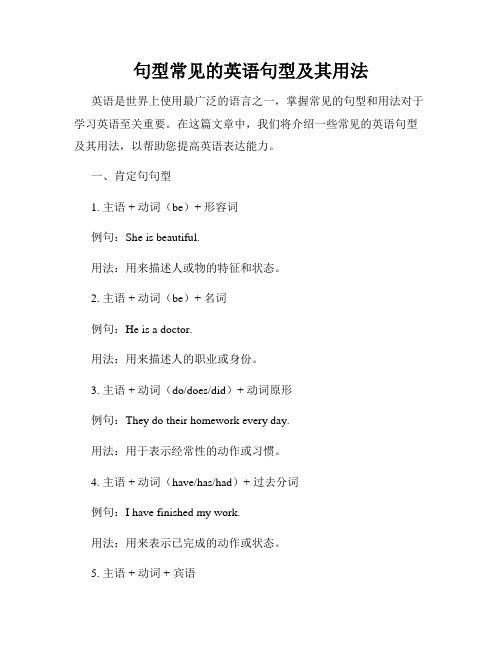
句型常见的英语句型及其用法英语是世界上使用最广泛的语言之一,掌握常见的句型和用法对于学习英语至关重要。
在这篇文章中,我们将介绍一些常见的英语句型及其用法,以帮助您提高英语表达能力。
一、肯定句句型1. 主语 + 动词(be)+ 形容词例句:She is beautiful.用法:用来描述人或物的特征和状态。
2. 主语 + 动词(be)+ 名词例句:He is a doctor.用法:用来描述人的职业或身份。
3. 主语 + 动词(do/does/did)+ 动词原形例句:They do their homework every day.用法:用于表示经常性的动作或习惯。
4. 主语 + 动词(have/has/had)+ 过去分词例句:I have finished my work.用法:用来表示已完成的动作或状态。
5. 主语 + 动词 + 宾语例句:She loves her dog.用法:用来表示动作的主体和对象。
二、否定句句型1. 主语 + 动词(be)+ not + 形容词例句:They are not happy.用法:用来表示否定的状态或特征。
2. 主语 + 动词(do/does/did)+ not + 动词原形例句:He does not like coffee.用法:用来表示否定的动作或习惯。
3. 主语 + 动词(have/has/had)+ not + 过去分词例句:We have not seen the movie.用法:用来表示否定的已完成动作或状态。
4. 主语 + do/does/did + not + 动词原形 + 宾语例句:She does not drink milk.用法:用来表示否定的动作和对象。
三、疑问句句型1. 助动词(be/do/does/did) + 主语 + 动词原形 + 其他?例句:Are you going to the party?用法:用来询问具体的情况或行动。
100个最重要的英语核心句型

100个最重要的英语核心句型1. welcome to sp 欢迎到某地Eg. Welcome to China.2. What’s the matter with sb./ sth? 出什么毛病了?Eg. What’s the matter with your watch?3. be different from 与......不同Eg. The weather in Beijing is different from that of Nanjing.4. be the same as 与……相同Eg. His trousers are the same as mine.5. be friendly to sb. 对某人友好Eg. Mr. Wang is very friendly to us.6. want to do sth. 想做某事Eg. I want to go to school.7. want sb. to do sth. 想让某人做某事Eg. I want my son to go to school.8. what to do 做什么Eg. We don’t know what to do next.9. let sb. do sth. 让某人做某事Eg. Let him enter the room.10. let sb. not do sth. 让某人不做某人Eg. Let him not stand in the rain.11. why don’t you do sth?怎么不做某事呢?Eg. Why don’t you play football with us?12. why not do sth.? 怎么不做某事呢?Eg. Why not play football with us?13. make sb. sth. 为某人制造某物Eg. My father made me a kite.14. make sth for sb. 为某人制造某物Eg. My father made a kite for me.15. What …mean by …? 做……是什么意思?Eg. What do you mean by doing that?16. like doing sth. 喜欢做某事Eg. Jim likes swimming.17. like to do sth. 喜欢做某事Eg. He doesn’t like to swim now.18. feel like doing sth. 想做某事Eg. I feel like eating bananas.19. would like to do sth. 愿意做某事Eg. Would you like to go rowing with me? 20. would like sb. to do sth. 愿意某人做某事Eg. I’d like you to stay with me tonight.21. make sb. do sth. 使某人做某事Eg. His brother often makes him stay in the sun.22. let sb. do sth. 让某人做某事Eg. Let me sing a song for you.23. have sb. do sth. 使某人做某事Eg. You shouldn’t have the students work so hard.24. be far from sp 离某地远Eg. His school is far from his home.25. be near to sp 离某地近Eg. The hospital is near to the post office.26. be good at sth./doing sth. 擅长某事/做某事Eg. We are good at English.They are good at boating.27. It takes sb. some time to do sth. 某人花多少时间做某事Eg. It took me more than a year to learn to draw a beautiful horse in five minutes.28. sb. spends some time/money (in )doing sth. 某人花多少时间做某事Eg. I spent twenty years in writing the novel.29. sb. spends some time/money on sth. 某事花了某人多少时间/金钱Eg. Jim spent 1000 yuan on the bike.30. sth. costs sb. some money. 某物花了某人多少钱Eg. The bike cost Jim 1000 yuan.31. sb. pays some money for sth. 某人为某物付了多少钱Eg. Jim paid 1000 yuan for the bike.32. begin/start with sth. 开始做某事Eg. The started the meeting with a song.33. be going to do sth. 打算做某事Eg. We are going to study in Japan.34. call A B 叫A BEg. They called the village Gumtree.35. thank sb. for sth./doing sth. 感谢某人做某事Eg. Thank you for your help.Thank you for helping me.36. What ……for? 为什么Eg. What do you learn English for?37. How/ what about doing sth.?做某事怎么样?Eg. How about going fishing?38. S +be+ the+最高级+of/in短语Eg. Lucy is the tallest in her class.39. S + be +比较级+than any other + n.Eg. Lucy is taller than any other student in her class.40. have to do sth. 不得不做某事Eg. I have to go home now.41. had better do sth. 最好做某事Eg. You’d better study hard at English.42. had better not do sth. 最好别做某事Eg. You’d better not stay up.43. help sb. to do sth. 帮助某人做某事Eg. Lucy often helps Lily to wash her clothes.44. help sb. do sth. 帮助某人做某事Eg. He usually helps me learn English.45. help sb. with sth. 帮助某人做某事Eg. I sometimes help my mother with the housework.46. make it +时间把时间定在几点Eg. Let’s make it 8:30.47. take sb. to sp 带某人到某地Eg. Mr. Wang will take us to the Summer Palace next Sunday.49. have nothing to do (with sb) 与某人没有关系Eg. That has nothing to do with me.50. 主语+ don’t think + 从句认为……不……Eg. I don’t think it will rain tomorrow.51. I t’s + adj.+ for sb. to do sth. 做某事对某人来说怎么样Eg. It is lucky for you to go to London.52. How + adj/ adv + 主+ 谓!多么……啊!Eg. How beautiful the flower is!53. what + a/an + adj + n + 主+ 谓!Eg. What an beautiful flower it is!54. What + adj+ pl./[u] +主+ 谓!Eg. What bad weather it is today!55. find it + adj+ to do sth. 发现做某事如何Eg. I find it hard to speak English well!56. ask sb. for sth. 向某人要某物Eg. They often ask me for money.57. need to do sth. 需要做某事Eg. You need to study hard.58. need sth 需要某物Eg. I don’t n eed your money.59. use A to do B 用A来做BEg. We use pens to write.60. show sb. sth 给某人看某物Eg. Please show me the map.61. show sth. to sb. 把某物给某人看Eg. Please show the map to me.62. pass sb. sth. 把某物递给某人Eg. Pass me the cup of tea.63. pass sth. to sb. 把某物递给某人Eg. Pass the cup of tea to me.64. buy sb. sth. 为某人买某物Eg. Mother bought me a bike.65. buy sth. for sb. 为某人买某物Eg. Mother bought a bike for me.66. give sb. sth 把某物给某人Eg. Jim gave me an English dictionary.67. give sth. to sb. 把某物给某人Eg. Jim gave an English dictionary to me.68. get to sp 达到某地Eg. I got to Beijing on the morning of May 1st.69. arrive at /in sp 达到某地Eg. I arrived in Beijing on the morning of May 1st.70. reach sp 到达某地Eg. I reached Beijing on the morning of May 1st.71. hope to do sth. 希望某人做某事Eg. I hope to see you soon.72. there is sth. wrong with sth./sb. 某物/某人出什么状况了Eg. There is something wrong my car.73. sth. is wrong with … 某物出什么毛病了Eg. Something is wrong with my car.74. How do you like sth? 你认为……怎么样?Eg. How do you like Beijing?75.What do you think of sth.? 你认为……怎么样?Eg. What do you think of Beijing?76. start doing sth. 开始做某事Eg. I started learning English in 1983.77. start to do sth. 开始做某事Eg. I started to watch TV after finishing my homework. 78.finish doing sth. 完成作某事Eg. I finished cleaning my car just now.79. enjoy doing sth. 喜欢做某事Eg. They all enjoy living and working in China.80.What / when / where / who / something / anything /nothing else …… 别的什么/何时/何地/谁……Eg. What else do you want to buy?Where else have you gone?Who else have you played with?I have nothing else to tell you.Would you like something else?81. forget doing sth. 忘记做过某事了(已做)Eg. I forgot turning off the lights. Look, it is dark in the room.82. forget to do sth. 忘了做某事了(未做)Eg. I forgot to turn off the lights. Could you go back and shut the off?83. remember doing sth. 记得做过某事了(已做)Eg. I remembered returning your money. You are so forgetful.84. remember to do sth. 记住去做某事(未做)Eg. Remember to bring me some money. I’ve run out of it.85.stop to do sth. 停下来去做某事Eg. He stopped to talk with Mary when she enter the office.86. stop doing sth. 停止做某事Eg. The students stopped talking when the teachet came in.87. watch/see/hear sb. do sth. 观看/看见/听见某人做了某事(全过程)Eg. I saw you pick an apple just now.88. watch/see/hear sb. doing sth. 观看/看见/听见某人正在做某事(点动作)Eg. I saw you playing basketball with your classmates on the playground last Sunday.89. go on doing sth. 继续作某事Eg. He went on reading after a short rest.90. go on to do sth. 继续作某事Eg. He went on to read after finishing wash the dishes.91. go on with sth. 继续某事Eg. He went on with his work after a short rest.92. say hello/goodbye to sb. 向某人告别Eg.I came to say good-bye to you.93. be busy doing sth. 忙于做某事Eg. They are busy planting trees on the hill.94. be interested in sth. 对某事感兴趣Eg. English is very interesting. We are all interested in it.95. tell sb. to do sth. 告诉某人做某事Eg. Mother told me to go shopping with her.96. ask sb. to do sth. 让某人做某事Eg. Jim ask me to go rowing with him.97. call/ring sb. up 给某人打电话Eg. I will call you up tommow.98. be ready to do sth. 准备做某事Eg. We are ready to have lunch.99. go doing sth. 去做某事Eg. Let’s go fishing.100. prefer A/doing A to B/doing B 比起A/做A,更喜欢B/做BEg. Lucy prefers English to French.I prefer staying at home to going to the cinema.[来源]北京数学压轴题.学习者在阅读。
初中语文常用句型总结归纳

初中语文常用句型总结归纳初中语文学习中,掌握常用句型对于写作和阅读理解非常重要。
本文将对初中语文常用句型进行总结归纳,帮助同学们更好地运用句型,提高语文学习水平。
1. 描述句型(1) 主语 + 动词 + 宾语例如:小明吃了一个苹果。
(2) 主语 + be动词 + 表语例如:上海是中国的一个城市。
(3) 主语 + 动词 + 宾语 + 宾补例如:他们选举他为班长。
(4) 主语 + 动词 + 宾语 + 宾语补足语例如:他认为你是最好的。
(5) 主语 + 动词 + 地点状语例如:他在公园散步。
2. 表达观点句型(1) 我认为/相信/觉得...例如:我认为读书很重要。
(2) 对我来说...例如:对我来说,友谊比金钱更重要。
(3) 从我的角度看...例如:从我的角度看,这个问题很复杂。
(4) 我赞成/反对...例如:我赞成学校禁止使用手机。
(5) 根据我的经验...例如:根据我的经验,锻炼可以提高身体健康。
3. 表示因果关系句型(1) 由于/因为...例如:由于下雨,他没有去公园玩。
(2) 所以/因此/因而...例如:他学习刻苦,所以考试取得了好成绩。
(3) 既然...就...例如:既然你有时间,就来参加我们的聚会吧。
(4) 结果...例如:他迟到了,结果被老师批评了一顿。
(5) 由此可见...例如:由此可见,阅读对于提高语文水平非常重要。
4. 表示并列关系句型(1) 不仅...而且...例如:他不仅认真学习,而且积极参加社会实践活动。
(2) 除了...还...例如:除了篮球,他还会打乒乓球。
(3) 不但...而且...例如:他不但成绩优秀,而且乐于助人。
(4) 一方面...另一方面...例如:一方面,我喜欢音乐;另一方面,我也热爱运动。
(5) 无论...还是...例如:无论是阅读还是写作,都需要持之以恒。
5. 表示比较句型(1) A比B更...例如:她比我更漂亮。
(2) A和B一样...例如:这两本书一样好。
高考英语经典句型必备
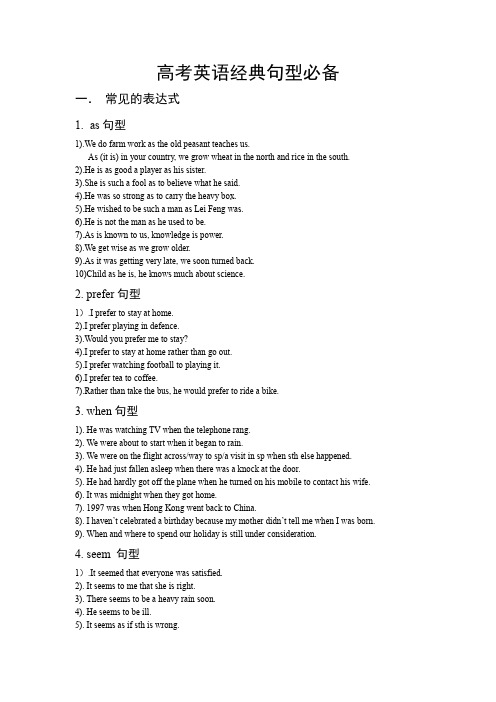
高考英语经典句型必备一.常见的表达式1.as句型1).We do farm work as the old peasant teaches us.As (it is) in your country, we grow wheat in the north and rice in the south.2).He is as good a player as his sister.3).She is such a fool as to believe what he said.4).He was so strong as to carry the heavy box.5).He wished to be such a man as Lei Feng was.6).He is not the man as he used to be.7).As is known to us, knowledge is power.8).We get wise as we grow older.9).As it was getting very late, we soon turned back.10)Child as he is, he knows much about science.2. prefer句型1).I prefer to stay at home.2).I prefer playing in defence.3).Would you prefer me to stay?4).I prefer to stay at home rather than go out.5).I prefer watching football to playing it.6).I prefer tea to coffee.7).Rather than take the bus, he would prefer to ride a bike.3. when句型1). He was watching TV when the telephone rang.2). We were about to start when it began to rain.3). We were on the flight across/way to sp/a visit in sp when sth else happened.4). He had just fallen asleep when there was a knock at the door.5). He had hardly got off the plane when he turned on his mobile to contact his wife.6). It was midnight when they got home.7). 1997 was when Hong Kong went back to China.8). I haven’t celebrated a birthday because my mother didn’t t ell me when I was born.9). When and where to spend our holiday is still under consideration.4. seem 句型1).It seemed that everyone was satisfied.2). It seems to me that she is right.3). There seems to be a heavy rain soon.4). He seems to be ill.5). It seems as if sth is wrong.5. 表示“相差……;增加了……;增加到……”句型1).She is taller than me by three inches.2). There is one year between us.3). She is three years older than I.4).They have increased the price by 20%.5).The temperature has risen to 40℃ today.6. what引导的名词性从句1)。
英语十四个句型
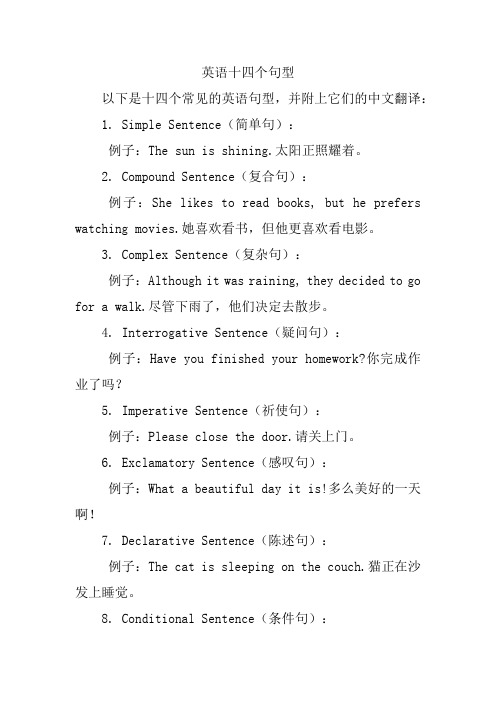
英语十四个句型以下是十四个常见的英语句型,并附上它们的中文翻译:1. Simple Sentence(简单句):例子:The sun is shining.太阳正照耀着。
2. Compound Sentence(复合句):例子:She likes to read books, but he prefers watching movies.她喜欢看书,但他更喜欢看电影。
3. Complex Sentence(复杂句):例子:Although it was raining, they decided to go for a walk.尽管下雨了,他们决定去散步。
4. Interrogative Sentence(疑问句):例子:Have you finished your homework?你完成作业了吗?5. Imperative Sentence(祈使句):例子:Please close the door.请关上门。
6. Exclamatory Sentence(感叹句):例子:What a beautiful day it is!多么美好的一天啊!7. Declarative Sentence(陈述句):例子:The cat is sleeping on the couch.猫正在沙发上睡觉。
8. Conditional Sentence(条件句):例子:If it rains, we will stay indoors.如果下雨,我们会呆在室内。
9. Passive Voice Sentence(被动语态句):例子:The cake was baked by Mary.蛋糕是玛丽烤的。
10. Direct Speech Sentence(直接引语句):例子:She said, "I will be there at 5 o'clock."她说:“我会在5点钟到那里。
我认为的高级句型

我认为的高级句型
1. 主语 + 谓语 + 宾语 + 宾补结构
例如:我发现这本书很有趣。
2. 主语 + 谓语 + 间接宾语 + 直接宾语
例如:我给他一本书。
3. 主语 + 谓语 + 宾语 + 状语
例如:我在图书馆看了一本好书。
4. 主语 + 谓语 + 宾语 + 定语从句
例如:这是我昨天在书店买的那本书,它的作者是一位著名作家。
5. 主语 + 谓语 + 宾语 + 并列结构
例如:我喜欢吃苹果、香蕉和橙子。
6. 主语 + 谓语 + 宾语 + 比较结构
例如:我觉得这部电影比那部电影好看。
7. 主语 + 谓语 + 宾语 + 虚拟语气
例如:如果我是国王,我会建立一个和平的国家。
8. 主语 + 谓语 + 宾语 + 倒装结构
例如:我从未见过如此美丽的风景。
9. 主语 + 谓语 + 宾语 + 强调结构
例如:我确实喜欢这部电影。
10. 主语 + 谓语 + 宾语 + 省略结构
例如:你问我问题,我回答你。
这些句型可以根据需要进行组合和扩展,形成更复杂的句子结构。
在实际运用中,可以根据语境和表达需求灵活运用这些句型,提高语言表达的丰富性和准确性。
英语中一就英语经典句型

英语中一就英语经典句型英语中一就英语经典句型十四类最经典句型一、表“倍数”A是B的多少倍关系的必背句型1.A+is+倍数+times+比较级+than+B2.A+is+倍数+times+as+原级+as+B3.A+is+倍数+times+size(height,length…)+of+BThetrainrunssixtimesfasterthantheboat.火车比轮船快六倍。
Thisgardenisthetimesaslargeasthatone.这个花园是那个的十倍大。
Theirne/little/hardly/few/nowhere/nor/nomore/nolonger/in noway/bynomeans/atnotime等)4.Notonly…butalso引导并列分句,notonly位于句首时用倒装5.so…that句型中的so位于句首时用倒装6.so+助动词+主语(表示“也”),nor、neither+助动词+主语(表示“也不”)十一、表示“做某事有/无困难”的必备句型1.havesome/much/no/littledifficulty/troubleindoingsth.2.haveahardtime/aprobleminsth./doingsth.3.takegreat/alotoftroubletodosth.十二、表示“解释原因”的必备句型1.Thereasonisthat…表示“原因是……”2.Thisiswhy…表示“这就是…….点的原因”3.thereasonwhy…isthat…表示“……的原因是……”十三、表示“评价、评论”意义的必备句型1.Whatdoyouthinkof…?Howdoyoufeel/find/like…?表示“你认为…….怎么样?”2.WhatisSb.Like?表示“某人长得、品质怎么样?”3.Whatis…like?表示“……怎么样?”一···就···英语篇二:高中英语词组大全·ashortcut近路/捷径适应于(做)某事beadaptedtosth./doing·abandononeselftosth沉湎于…·beabletodosth.有能力做某事·addtobeauty/difficultiesbecapableofdoingsth.增添了美丽/困难有能力做某事·addupto 合计达…·dosth.tothebestofone’sabilityamountto合计达…尽某人全力做某事·inaddition此外,另外·abnormalbehavior反常的行为·inadditiontosth.除…之外·aboveall最为重要的.是·admiresb.forsth.羡慕/钦佩某人某事·actas担任;充当·takeactiontodosth.采取行动做某事·takeanactivepartin积极参加…·adaptoneselftosth./doing·alarmclock闹钟·bealerttosth./sb.对…警惕·allow…todosth.允许…做某事allowdoingsth.·leave…alone别管…·getalong/onwellwith…与…相处融洽;进展顺利1admitone’smistake承认某人的错误beadmittedtouniversity 被大学录取adoptone’sadvice采纳某人的建议adoptachild收养一个孩子inadvance预先advancedtechnology先进的技术takeadvantageof趁机利用haveabigadvantageover…与…相比有优势betoone’sadvantage对某人有好处advisesbtodosth.建议某人做某事advisedoingsth.currentaffairs时事can/beabletoaffordsth.支付得起…benamedafter…以…来命名againandagain再三地,反复地beagainstone'swill违背某人的意愿theaged年老者agreeon/uponsth..就…达成一致agreetoone’ssuggestion/proposal同意某人的建议agreewithone’ssuggestion/proposalaheadoftime提前firstaid急救aimatsth./doingsth.瞄准某物;旨在做某事beamazed/surprised/astonishedat…对…很惊讶one’sambitiontodosth.。
- 1、下载文档前请自行甄别文档内容的完整性,平台不提供额外的编辑、内容补充、找答案等附加服务。
- 2、"仅部分预览"的文档,不可在线预览部分如存在完整性等问题,可反馈申请退款(可完整预览的文档不适用该条件!)。
- 3、如文档侵犯您的权益,请联系客服反馈,我们会尽快为您处理(人工客服工作时间:9:00-18:30)。
十四类最经典句型
一、表“倍数”A是B的多少倍关系的必背句型
1.A+is+倍数+times+比较级+than+B
2.A+is+倍数+times+as+原级+as+B
3.A+is+倍数+times+size(height,length…)+of+B
The train runs six times faster than the boat.
火车比轮船快六倍。
This garden is the times as large as that one.
这个花园是那个的十倍大。
Their newly-built school is almost twice the size of ours which was built ten years ago.
他们新修建的学校几乎是我们十年前修建的学校的两倍大。
二、表示“越··,越来··”的必备句型
1.the+比较级··,the+比较级··
2.比较级+and+比较级
The more you listen to English,the easier is becomes.
你听的英语越多,就越容易听懂。
It’s getting colder and colder.
天气变得越来越冷了。
三、表示“花费(时间/金钱)做某事”的四个必备句型
1.sth. cost sb. Some money表示“某物花费某人多少钱”
2.sb。
Spend some time/money on sth./in doing sth.表示“某人花费
多少时间活多少金钱在某事上面或做某事”
3.It takes sb. some time to do sth.表示“做某事花费某人多少时间”
4.sb. Pay some moneyto sb.for sth.表示“某人付给某人多少钱买了
什么东西”
A new dress costs your over four hundered francs.
一件新晚礼服得花400多法郎。
She spent two hours in fishing her homework.
他花了两个小时完成家庭作业。
It took him three hours to draw the horse.
他花了三个小时画了这匹马。
The girl paid the old man 200 yuan for the new bike.
这女孩支付给这个老人200元买了这辆新自行车。
四、“be of+抽象名词”,用于描述人或物性格、性质或特征
常用的抽象名词有use/help/value/importance/benefit。
此结构还可以与表示年龄(age)、颜色(color)、样式(shape/type)、大小(size)等的词连用。
They are of great help to learners of English.
他们对学习英语的人来说大有帮助。
五、表示“尽可能地做”的必备句型
1.do all/what/everything sb. Can to do
2.as…as possible=as…as one can
She did all she could to help him.
她做了能做的一切来帮助他。
The boy ran towards school as fast as he could.
男孩以最快的速度朝学校跑去。
六、祈使句+and/then/or(else)/otherwise+陈述句
Use your head,than/and you’ll have a good idea.
动动脑筋,你就会有好办法的。
Hurry up,or you will be late.
快点,要不然你就迟到了。
七、表示“一··就”的必备句型
1.as soon as/immediately/the moment/the minute
2.hardly(scarcely)…when 引导时间状语从句
3.no sooner…than引导时间状语从句
Fortunately someone who happened to be passing by called the fire department immediately the fire broke out.
幸运的是,火灾一发生一个碰巧路过的人就给消防站打了电话。
I put a note on the door in order that he sees it the moment he comes back.
我在门上给他留了个便条,以便他一回来就能看到。
Hardly had he got to the office when the mobile phone rang.
他一到办公室手机就响了。
He had no sonner got to the lab than he set out to do the。
